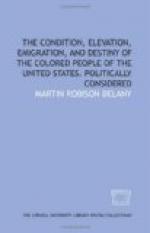“When Major Montgomery, one of the leaders in the expedition against the colonists, was lifted upon the walls of the fort by his soldiers, flourishing his sword and calling on them to follow him, Jordan Freeman received him on the point of a pike and pinned him dead to the earth.” “NEW HAMPSHIRE gives her testimony to the deposit of colored interest. There was a regiment of blacks in the same situation, a regiment of negroes fighting for our liberty and independence, not a white man among them but the officers, in the same dangerous and responsible position. Had they been unfaithful, or given way before the enemy all would have been lost. Three times in succession were they attacked with most desperate fury by well disciplined and veteran troops, and three times did they successfully repel the assault, and thus preserve the army. They fought thus through the war. They were brave and hearty troops.” Nell, pp. 11, 13.
NEW YORK comes bravely to the call, and sends her investments by land and sea. In the convention of 1821, for revising the constitution of the State, the question of equal rights having been introduced, Doctor Clarke among other things said, “In the war of the Revolution, these people helped to fight our battles by land and by sea. Some of your states were glad to turn out corps of colored men, and to stand ‘shoulder to shoulder’ with them. In your late war, they contributed largely towards some of your most splendid victories. On lakes Erie and Champlain, where your fleets triumphed over a foe superior in numbers and engines of death, they were manned in a large proportion with men of color. And in this very house, in the fall of 1814, a bill passed receiving all the branches of your government, authorising the governor to accept the services of a corps of two thousand free people of color. These were times when a man who shouldered his musket did not know but he bared his bosom to receive a death wound from the enemy ere he laid it aside; and in these times these people were found as ready and as willing to volunteer in your service as any other. They were not compelled to go; they were not draughted.... They were volunteers....” Said Martindale of New York in congress 22 of first month 1828: “Slaves, or negroes who had been slaves, were enlisted as soldiers in the War of the Revolution; and I myself saw a battalion of them, as fine martial looking men as I ever saw, attached to the northern army in the last war, on its march from Plattsburg to Sackett’s Harbor.”
PENNSYLVANIA contributes an important share in the stock of Independence, as will be seen by the following historical reminiscence: “On the capture of Washington by the British forces, it was judged expedient to fortify without delay, the principal towns and cities exposed to similar attacks. The Vigilance Committee of Philadelphia waited upon three of the principal Colored citizens, namely, James Forten, Bishop Allen, and Absalom Jones, soliciting the aid




